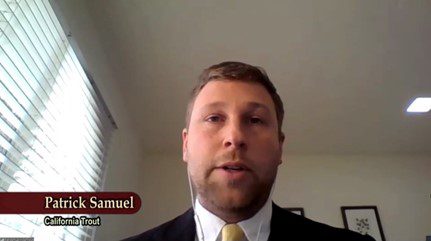Capitol Corner: Saving Salmon in a Drought
Welcome to Capitol Corner, a new series dedicated to providing updates on CalTrout’s legislative and policy work. CalTrout’s policy team includes Redgie Collins (Legal and Policy Director) and Analise Rivero (Policy Associate). Between the two, Redgie and Analise are responsible for the development and implementation of CalTrout’s natural resource and water policy agenda in the California state legislature. This includes supporting CalTrout’s organizational goals through regulatory and public funding advocacy, agency relationship building, partnership development and other policy-related objectives that add to CalTrout’s success.

 By Redgie Collins and Analise Rivero
By Redgie Collins and Analise Rivero
In July 2021, CalTrout’s Bay Area Regional Director Patrick Samuel provided expert testimony (remotely) at the California State Legislature Joint Committee on Fisheries and Aquaculture hearing entitled “California Salmon Fisheries in Crisis: Historic Drought, Low Flows, and Dead Fish.” As you will read below, it was an honor for CalTrout to be invited to this hearing and a great opportunity to share our drought response recommendations with legislators.
The hearing focused on the 2021 salmon fishing season, severe drought, lethal conditions for fish throughout the state, and the impacts to Indigenous peoples, commercial and recreational fisheries, and the environment. The agenda featured presentations by state agency leaders, researchers, and Tribal, commercial, and recreational fishing representatives. Notable presenters included Joseph James, Chairman of the Yurok Tribe, Russell “Buster” Attebery, Chairman of the Karuk Tribe, Chuck Bonham, director of the California Department of Fish and Wildlife, Eileen Sobeck, executive director of the State Water Resources Control Board, James Stone, president of the Nor-Cal Guides and Sportsmen’s Association, Mike Conroy, executive director of the Pacific Coast Federation of Fishermen’s Associations, Barry Nelson, policy representative for the Golden State Salmon Association, Kate Poole, senior attorney for the California’s Natural Resources Defense Council, Patrick Samuel, Bay Area Regional Director for California Trout, Mark Bransom, CEO of the Klamath River Renewal Corporation, and Don McEnhill, executive director of Russian Riverkeeper.
Background on the Joint Committee of Fisheries and Aquaculture
The Joint Committee on Fisheries and Aquaculture, comprised of legislators from both the State Senate and State Assembly, studies California policy issues and problems related to Fisheries and Aquaculture to develop long range solutions. The committee may hold hearings or educational forums related to fisheries and aquaculture. It also works with other standing committees (e.g. Water, Parks and Wildlife, Natural Resources, budget, etc.) and multi-state committees (e.g. Pacific Fisheries Legislative Task Force) to provide information on relevant fisheries and aquaculture issues. The Committee provides a direct link between the fishing and aquaculture field and the legislature.
Below is an outline of the testimony provided by Patrick at the hearing.
Background
CalTrout is a statewide conservation nonprofit organization that has been working with diverse partners for 50 years to ensure resilient wild fish thrive in healthy waters for a better California.
As you have heard, extreme drought and low flow conditions, like we are experiencing this year, wipe out entire cohorts of several listed runs of coho salmon and Chinook salmon from the Klamath tributaries, Sacramento River, and in coastal watersheds as well in Northern California. We have been here before in the drought of 2012-2016 where we were woefully unprepared and nearly lost entire year classes of winter-run Chinook and other salmon. California will continue to experience periods of extreme drought that will continue to degrade California’s largely arid ecosystems and threaten coldwater fishes like salmon without concerted action and change.
Recommendations
- Functional Flows
CalTrout fully supports the Drought Emergency Recommendations for the Shasta and Scott rivers. We also encourage CDFW and SWB to consider long-term management and protections for salmonids by implementing target functional flow regimes for major basins that are based on rigorous science and climate projections for all of California. Effective functional flows should include: 1) fall pulse flows (2) wet-season peak flow (3) wet-season baseflows (4) spring recession flow, and (5) dry-season baseflow.
- Adequate Enforcement
We encourage effective curtailing of water diversions—surface water and groundwater withdrawals—on private lands. Voluntary measures alone, while important, are not sufficient to achieve the functional flows needed to support all salmonid life-stages. Adequate enforcement of existing water rights requires sufficient stream gaging and database updates to measure the effects of these flows and to ensure dedicated water ends up in-stream.
- Drought Section of Division of Water Rights
We recommend funding for the State Water Board to form a dedicated Drought Section to support real-time management and processing regulatory approvals to drought response. California is the only Western State to not have a permanent drought unit. The Salmon and Steelhead Coalition (Trout Unlimited, CalTrout and The Nature Conservancy) have urged the legislature to fund this program permanently and to a functional level.
- Flexibility
We need better incentives for landowners for sufficient long-term leases, and flexibility in funding for securing short-term leases during drought emergencies with streamlined permitting and water rights transfers to more easily facilitate transactions. We need this funding allocated to agencies and into the pockets of landowners before September 1st to have any effect this fall. If this is not possible, then these monies should be allocated toward mandatory curtailment enforcement.
- Additional Drought Funding
Additional funding will be needed for the new Drought Section, prioritized stream gaging and database upgrades, implementing environmental flows framework, ramping up enforcement targeting non-compliance with curtailment, and significantly increasing funding for grants under the Streamflow Enhancement Program to protect fish and wildlife during drought. We have requested funding for these objectives in the Governor’s May Revise.
Conclusion
In conclusion, CalTrout strongly supports the Shasta-Scott Flow Recommendations and Klamath Watershed Special Drought Regulations and the development of special drought regulations for other watersheds which are scientifically-based. We commend CDFW and SWRCB for providing leadership during the drought crisis and taking the time to present recommendations to the public, but more work is needed to ensure we remain a salmon state. More specifically, we urge CNRA and CalEPA to work with the Conservation community, Environmental Justice Organizations, Tribal Nations, and others to pursue permanent drought so that California can fulfill its Public Trust obligations. The future of salmon in California hinges on the cooperation of all water users. CalTrout embraces the complexity of balancing the needs of wild fish and people, and we look forward to working with you to identify and implement solutions.






